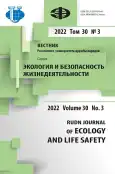Purification of domestic wastewater with a sand filter from biogenic elements
- Autores: Volkova V.N.1, Golovin V.L.1, Kirichenko K.Y.1,2
-
Afiliações:
- Far Eastern Federal University
- Siberian Federal Research Center for Agrobiotechnologies RAS
- Edição: Volume 30, Nº 3 (2022)
- Páginas: 332-344
- Seção: Industrial Ecology
- URL: https://journal-vniispk.ru/2313-2310/article/view/323985
- DOI: https://doi.org/10.22363/2313-2310-2022-30-3-332-344
- ID: 323985
Citar
Texto integral
Resumo
Wastewater after biological wastewater treatment very often exceeds the natural ability of reservoirs and watercourses to self-purify. Increasing requirements for the environmental safety of wastewater discharge into natural water bodies determines the particular relevance of improving technological methods and wastewater treatment facilities. In the world practice of post-treatment, preliminary filtration and filtration are rightfully considered one of the most effective methods. At the same time, one of the most common devices used in post-treatment of wastewater are sand filters with granular filter material, the effectiveness of which is often overestimated. The problems of post-treatment of wastewater by filtration using sand filters with a granular filter load are considered, the main problems that arise when using such devices are considered without taking into account the features of post-treatment processes in the presence of organic matter in highly dispersed colloidal forms. Substantiated are additional requirements for reducing the concentration of toxic substances when discharging wastewater into natural water bodies and minimizing changes in the conditions for the development of the biocenosis of these objects. The reasons for the insufficient efficiency of wastewater post-treatment on sand filters, including the reasons for the increase in the content of organic substances in the filtrate after post-treatment, are determined. The main criteria for the effective use of filtering devices in wastewater treatment systems are formulated.
Palavras-chave
Sobre autores
Vladislava Volkova
Far Eastern Federal University
Autor responsável pela correspondência
Email: vladavibi@bk.ru
ORCID ID: 0000-0001-9078-9858
postgraduate student, research engineer
10 pos. Ajax, o. Russian, Vladivostok, 690922, Russian FederationViktor Golovin
Far Eastern Federal University
Email: golovin.vl@dvfu.ru
Candidate of Technical Sciences Associate Professor, Professor 10 pos. Ajax, o. Russian, Vladivostok, 690922, Russian Federation
Konstantin Kirichenko
Far Eastern Federal University; Siberian Federal Research Center for Agrobiotechnologies RAS
Email: kirichenko2012@gmail.com
ORCID ID: 0000-0002-2715-3758
Candidate of Biological Sciences, Leading Researcher of the SFSC RAS, Researcher of the Scientific and Organizational Department of the Polytechnic Institute
10 pos. Ajax, o. Russian, Vladivostok, 690922, Russian FederationBibliografia
- Kirsanov VV. Sanitary and hygienic characteristics of the possible impact on the health of the population by-products of chlorination of waste and drinking water. Bulletin of the Kazan Technological University. 2012;15(4):93–96. (In Russ.).
- Mitch WA. A N-Nitrosodimethylamine (NDMA) precursor analysis for chlorination of water and wastewater. Water Research. 2003;37(15):3733–3741. https://doi.org/10.1016/S0043-1354(03)00289-6
- Arshidinov MM, Ospanova GSh. Ozonization purification of industrial plants wastewater. Bulletin of the Almaty University of Energy and Communications. 2020;3(50):90–95. https://doi.org/10.51775/1999-9801_2020_50_3_90
- Shikhaleva EP. The use of ozonation in wastewater treatment technology. Santekhnika. 2019;(6):40–47. (In Russ.).
- Makisha NA. Issues of intensification of methods of biological wastewater treatment. Vestnik MGSU. 2008;(S1):174–177. (In Russ.).
- Ulchenko VM. Post-treatment of wastewater on filters with granular loading. Water supply and sanitation. 2010;(12):34–38. (In Russ.).
- Bezrodnaya IV, Klenikov SS. On the issue of liquid filtration as the main stage of water purification. Modern high technologies. 2006:98–100. (In Russ.).
- Makisha NA. Research for wastewater treatment technology with low production of excessive active sludge. MATEC. 2017;106:07016.
- Volkova VN, Golovin VL. Methods for reducing the negative impact of return water on biological treatment. Ecology of industrial production. 2021;(4):17–22. (In Russ.).
- Volkova VN, Golovin VL. Post-treatment of wastewater on a filmless slow filter. Ecology and Industry of Russia. 2021;25(6):15–19. (In Russ.)
- Galantseva LF, Shakhina SV. Friedland's research on wastewater treatment of Chistopol from phosphates. Bulletin of the Kazan Technological University. 2010;(2):311–314. (In Russ.).
- Volkova VN, Golovin VL. Macrokinetic Model of Biochemical Oxidation. Lecture Notes in Civil Engineering, Springer Nature. 2021:487–494.
- Omelchenko AV. Fast filters. Water supply: a textbook for design engineers and students of the specialty Water supply and sanitation, LLC Center for the Promotion of Scientific Research. 2016:375–383. (In Russ.).
- Makisha NA. Research of ecology-friendly technology for elimination of ammonium from wastewater through the use of floating bed. E3S Web of Conferences, Ekaterinburg, May 19, 2016. Ekaterinburg: EDP Sciences; 2016. р. 01002. https://doi.org/10.1051/e3sconf/20160601002
Arquivos suplementares









